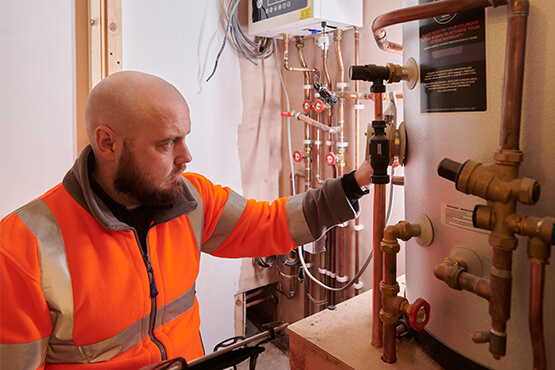380+ C-suite leaders from £100m+ businesses across the manufacturing, real estate and construction, retail and supply chain, technology, and energy and infrastructure sectors share their optimistic outlook for M&A inward investment deals in the coming year.
M&A and inward investment in 2025 will be shaped by a complex range of factors ranging from diverging ESG regulatory approaches to the expanding role of private equity and shifting government policies. More recently, global trade turbulence has dominated corporate agendas. The real story lies in how these broader forces intersect to influence investment decisions.
This article explores four critical themes redefining investment strategies: ESG considerations, the rising influence of private equity, tax regulations' impact, and government policy's role in stabilising investor confidence. Together, these provide a view of opportunities and challenges defining inward investment in the UK and Ireland over the next year.
A majority (56%) of respondents believe the UK Government's pro-growth policies will positively impact activity, particularly in technology and real estate. Energy and infrastructure respondents show most ambivalence, with 46% saying tax policy doesn't heavily impact their sector's M&A. The UK's post-Brexit regulatory flexibility is seen as an opportunity for emerging sectors.
Interestingly, 39% expect geopolitical tensions to increase investor caution, leading to fewer deals. However, 38% believe these tensions could drive a surge in deals as companies seek stable markets like the UK and Ireland. 39% expect investment to shift to more politically stable regions, with technology showing the strongest expectation at 45%.
ESG in 2025
Recent months have seen growing views (particularly since the US power transition) that ESG considerations are becoming irrelevant. However, our respondents believe ESG will continue influencing inbound M&A decisions.
35% view ESG factors as playing a significant role in M&A activities, with 50% acknowledging a moderate impact. The real estate and construction sector shows high acknowledgment of ESG's importance, with 97% recognising its role in investment decisions, and 40% prioritising sustainable practices.
While global consensus on ESG has weakened, this has created a more fragmented landscape adding complexity rather than diminishing importance. The US appears to be scaling back some ESG commitments while the EU is doubling down, proposing to simplify but not dilute reporting requirements. This divergence amplifies the need for legal support in navigating these complexities, particularly for companies using Ireland as a gateway to Europe.
ESG is becoming increasingly important for energy security and renewable energy transition. Geopolitical concerns around US and Russian energy supplies have intensified focus on sustainable energy projects in the UK and EU. According to the ONS, 74% of UK adults support renewable energy projects in their local areas, suggesting strong public favour for sustainable infrastructure development. This aligns with heightened awareness around the environmental impact of UK Government's development plans, influencing investor decisions.
While ESG regulation complexity presents challenges, it offers opportunities for companies to differentiate themselves through sustainable practices. Supply chain optimisation is crucial for ensuring ESG compliance throughout a business' operations. The divergence in ESG approaches across regions makes it a more critical consideration for investors.
The rise of private equity
Private equity firms have accumulated substantial “dry powder” since the pandemic. Global PE dry powder reached approximately $1.6 trillion by the end of 2024, resulting from previous investment slowdowns due to rising interest rates and global economic issues and uncertainties.
As market conditions stabilise, PE firms are increasingly seeking opportunities to deploy this capital, particularly in infrastructure and technology assets. In the UK and Ireland, 73% of respondents across all sectors expected increased PE activity.
The UK market is considered undervalued compared to regions like the US, making it attractive for PE investments seeking higher returns. Ireland's alignment with EU regulations and access to European markets without Brexit complexities enhances its appeal for PE firms seeking a stable yet strategically positioned market.
Impact of government policy
The UK Government has implemented several tax policy changes affecting inward investment, particularly concerning for the PE sector. A notable reform is increasing capital gains tax on carried interest from 28% to 32%, effective April 2025. This aligns carried interest taxation more closely with other income forms.
Further reforms are planned for April 2026, when carried interest will be taxed as trading profits subject to income tax and NICs, potentially resulting in an effective tax rate of approximately 34% for higher rate taxpayers. These changes have sparked discussions about the UK's competitiveness as an investment hub. In contrast, Ireland maintains a stable and attractive tax environment, with consistent corporate tax policies and strong EU alignment.
In the October 2024 Budget, Chancellor Rachel Reeves announced significant measures, including increasing employers' National Insurance contributions from 13.8% to 15%, effective April 2025. This is projected to generate £25bn annually by the forecast period's end. The British Retail Consortium warned that up to 160,000 part-time retail jobs could be lost over three years due to increased employer taxes and regulatory changes, likely leading to higher prices and job cuts.
Despite these concerns, our survey indicates 39% of respondents anticipate tax changes will attract investment, while 34% expect increased cautious investment seeking guaranteed returns. This suggests that although certain policies may increase operational costs, they're also viewed as creating a more stable investment environment.
Ireland's tax landscape continues attracting investors with its 12.5% corporate tax rate being a significant draw for multinational corporations and PE firms. While global tax reforms prompt discussions about minimum corporate tax rates, Ireland's commitment to maintaining a competitive regime bolsters its appeal.
Expert commentary
Gareth Davies, Private Equity Partner at Browne Jacobson, comments:
"Our findings reflect what we're increasingly seeing: investors are taking a broader, more geopolitical view of capital deployment. Regulatory certainty, market access, and political stability are top priorities as the global investment landscape becomes more fragmented.
"Recent US tariffs and industrial policy, coupled with divergence in ESG and data rules between major jurisdictions, is reshaping supply chains and creating friction in cross-border M&A. The UK and Ireland are both recalibrating their positions. For some investors, these pressures are deterrents; for others, opportunities to back resilient, domestically focused businesses that mitigate trade and energy exposure.
"Private equity is playing a leading role in that recalibration, with clear expectations for increased PE activity. With capital deployment comes complexity: from tax reform to regulatory divergence, corporates and fund managers need to structure deals more creatively with sharper focus on long-term compliance risk.
"The challenge for advisors is navigating this dual reality – a policy environment tightening in some areas while opening strategic opportunities in others. With the right structuring, timing and risk calibration, UK and Irish assets can still attract significant inward investment."
Contents
- Investing in the UK and Ireland
- Inward investment in the UK and Ireland in 2025: The big picture
- 2. Challenges and risks: Barriers to inbound M&A in the UK and Ireland
- 3. Geographical investment trends in UK and Ireland inbound M&A
- 4. Ireland: The gateway to Europe expects upward trend to continue with increased M&A in 2025
- 5. Shaping the future: The impact of AI and access to IP on the inward investment and inbound M&A
- M&A spotlights
- Conclusion: Inward investment in the UK and Ireland in 2025
Expert commentary

Gareth Davies
Partner
Gareth leads our Private Equity practice in the West Midlands from our Birmingham office. Gareth is recognised by Private Equity Sponsors and Management Teams as commercial, always available and able to get deals done.
Gareth.Davies@brownejacobson.com
+44 (0)330 045 2665
Contact

Gavin Cummings
Partner
gavin.cummings@brownejacobson.com
+44 (0)115 976 6157









































